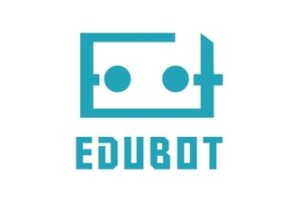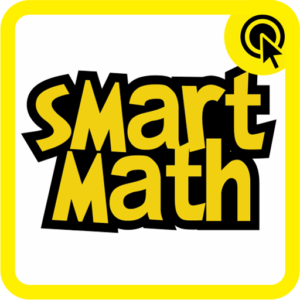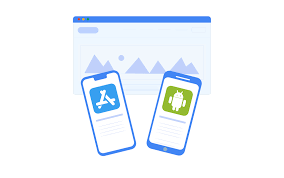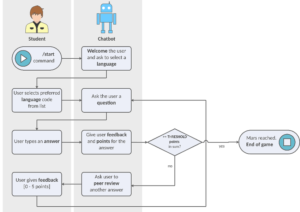AI Tools for Education and Students
Artificial intelligence is transforming various industries, and the field of education is no exception.
AI has the potential to revolutionize the way students learn, making education more personalized, interactive, and efficient. In this article, we will explore the top 10 AI tools for education and students that are reshaping the learning landscape.
- ABC Learning App
- EduBot
- SmartMath
- Language Master
- Virtual Reality Field Trips
- Study Planner
- Essay Assistant
- Virtual Tutor
- Data Analysis Companion
- AI-based Exam Prep

1. ABC Learning App
ABC Learning App is an innovative AI-powered platform that offers interactive lessons, quizzes, and personalized learning paths for students of all ages.
It uses advanced algorithms to adapt the content based on individual learning styles and progress, ensuring a tailored learning experience.
Pros:
- Interactive lessons and quizzes engage students and make learning enjoyable.
- Personalized learning paths cater to individual needs and learning styles.
- Advanced algorithms adapt content to match the student’s progress and pace.
- Provides instant feedback and performance tracking.
Cons:
- Limited subject coverage may not cater to all academic disciplines.
- Requires internet connectivity for full functionality.
Website: ABC Learning App

2. EduBot
EduBot is an intelligent chatbot designed to assist students with their academic queries. Powered by natural language processing (NLP).
EduBot can provide instant answers to questions, offer study tips, and even suggest additional resources for further learning.
With EduBot, students can access personalized support anytime, anywhere.
Pros:
-
Instant access to academic support and guidance.
-
Provides answers to students’ queries in real time.
-
Offers personalized study tips and resources.
-
24/7 availability ensures continuous support.
Cons:
-
May not address complex or specialized topics effectively.
-
Reliance on AI may limit the depth of human interaction.
Website: EduBot
|
Article for you – What is ChatGPT? Can ChatGPT dethrone Google? latest updates in 2023 |

3. SmartMath
Mathematics can be challenging for many students, but SmartMath makes it easier and more enjoyable.
This AI tool employs machine learning algorithms to identify areas where students struggle and provide targeted practice exercises and step-by-step explanations.
SmartMath helps students build a strong foundation in math while boosting their confidence.
Pros:
- Identifies areas where students struggle and provide targeted practice exercises.
- Step-by-step explanations enhance understanding and problem-solving skills.
- Promotes self-paced learning and builds a strong foundation in math.
- Boosts student confidence and motivation.
Cons:
- Limited to mathematics education.
- May not fully replace the guidance of a math teacher.
Website: SmartMath

4. Language Master
Language Master is a cutting-edge AI tool that enhances language learning.
It utilizes speech recognition and natural language understanding to simulate real-life conversations.
Students can practice their speaking and listening skills with Language Master, receiving instant feedback and improving their fluency and pronunciation.
Pros:
- Improves language fluency, pronunciation, and comprehension.
- Simulates real-life conversations for practical language application.
- Offers instant feedback for better learning outcomes.
- Enhances listening and speaking skills.
Cons:
- Limited language options may not cover all desired languages.
- Pronunciation accuracy may vary depending on the user’s speaking habits.
Website: Language Master
| Article for you – How Bing does work with ChatGPT and what benefit you can take |

5. Virtual Reality Field Trips
Traditional field trips are often limited by logistical constraints, but virtual reality (VR) field trips offer boundless possibilities.
With AI-powered VR experiences, students can explore historical landmarks, dive into the depths of the ocean, or even visit outer space.
These immersive journeys provide a hands-on learning experience that brings subjects to life.
Pros:
- Provides immersive learning experiences beyond the limitations of physical field trips.
- Expands students’ horizons and knowledge through virtual exploration.
- Enhances engagement and retention through interactive virtual environments.
- Cost-effective alternative to traditional field trips.
Cons:
- Requires access to VR equipment and technology.
- Limited availability of VR content for certain subjects.
Website: Virtual Reality Field Trips

6. Study Planner
Keeping track of assignments, exams, and study schedules can be overwhelming, but Study Planner simplifies the process. This AI-powered tool helps students organize their academic tasks, set reminders, and create personalized study plans. By optimizing their time management, students can achieve better results and reduce stress.
Pros:
- Helps students organize their academic tasks and schedules effectively.
- Promotes better time management and reduces stress.
- Personalized study plans to cater to individual needs.
- Sets reminders for assignments and exams.
Cons:
- Reliance on technology may lead to dependency.
- Requires regular updating and maintenance.
Website: Study Planner
| Article for you- ChatGPT 5 IS THE NEXT BIG THING IN ARTIFICIAL INTELLIGENCE. |

7. Essay Assistant
Writing essays is a fundamental skill for students, and Essay Assistant streamlines the process. This AI tool offers grammar and spell-checking capabilities, suggests improvements for sentence structure, and provides relevant resources for research. With Essay Assistant, students can elevate the quality of their writing and express their ideas more effectively.
Pros:
- Enhances writing skills and improves the quality of essays.
- Provides grammar and spell-checking capabilities.
- Offers suggestions for sentence structure and vocabulary.
- Provides relevant resources for research.
Cons:
- May not fully replace the guidance of a writing instructor.
- Accuracy of suggestions may vary.
Website: Essay Assistant

8. Virtual Tutor
Sometimes students require extra support outside the classroom, and that’s where Virtual Tutor comes in. This AI-powered tutoring system provides personalized instruction, adapting to the student’s learning pace and style. Virtual Tutor offers explanations, practice exercises, and instant feedback, acting as a reliable companion on the learning journey.
Pros:
- Offers personalized instruction tailored to the student’s pace and learning style.
- Provides explanations, practice exercises, and instant feedback.
- Available anytime, anywhere for convenient learning.
- Addresses individual learning gaps effectively.
Cons:
- Limited to the subjects covered by the virtual tutor.
- May not provide the same level of human interaction as in-person tutoring.
Website: Virtual Tutor

9. Data Analysis Companion
In the era of big data, understanding data analysis is crucial across various disciplines. The Data Analysis Companion is an AI tool that simplifies complex statistical concepts, helping students visualize data, analyze trends, and draw meaningful insights. It equips students with the necessary skills for data-driven decision-making.
Pros:
- Simplifies complex statistical concepts for easier comprehension.
- Enhances data visualization and analysis skills.
- Facilitates data-driven decision-making.
- Prepares students for real-world data challenges.
Cons:
- Limited availability of comprehensive datasets.
- May require prior knowledge of statistical concepts.
Website: Data Analysis Companion

10. AI-based Exam Prep
This tool provides tailored practice tests, performance analysis, targeted study materials, and strategies to improve time management and exam-taking skills. It may have limited availability for specific exams.
These AI tools are transforming education by making it more personalized, interactive, and efficient. They offer various benefits and cater to different learning needs. However, it’s important to consider their limitations and the need for a balanced approach combining AI tools with traditional methods.
Pros:
- Tailored practice tests based on the student’s strengths and weaknesses.
- Provides detailed performance analysis and feedback.
- Offers targeted study materials for exam preparation.
- Helps improve time management and exam-taking strategies.
Cons:
- Limited availability of practice tests for certain exams.
- May not cover all exam formats and question types.
Website: AI-based Exam Prep
How do AI Tools help students in their studies?
AI tools can provide numerous benefits to students in their studies. Here are some ways in which AI tools can assist students:
-
Personalized Learning: AI tools can adapt to individual student’s needs and learning styles, providing personalized learning experiences. These tools can analyze students’ performance, identify areas of strength and weakness, and generate customized study materials and recommendations.
-
Intelligent Tutoring: AI-powered tutoring systems can act as virtual tutors, offering interactive and adaptive learning experiences. These tools can provide real-time feedback, answer questions, explain concepts, and guide students through various subjects.
-
Enhanced Content Accessibility: AI tools can help students with disabilities by providing accessibility features such as text-to-speech conversion, speech recognition, and closed captioning. These tools enable students to access educational content more effectively, irrespective of their specific needs.
-
Efficient Content Creation: AI tools can assist students in creating and organizing their study materials. For instance, AI-powered note-taking tools can transcribe lectures, extract key points, and organize information for easy review. Additionally, AI can support students in generating summaries, writing papers, and proofreading their work.
-
Smart Study Assistants: AI-powered study assistants can schedule study sessions, set reminders, and track progress. These assistants can analyze study patterns, recommend effective study techniques, and optimize students’ time management for better productivity.
-
Virtual Laboratories and Simulations: AI tools can provide virtual laboratories and simulations, especially for subjects that require hands-on learning, such as science and engineering. These tools allow students to conduct experiments, visualize concepts, and gain practical experience in a safe and controlled environment.
-
Intelligent Grading and Feedback: AI-based grading systems can efficiently evaluate assignments, quizzes, and exams, providing prompt and consistent feedback to students. This automated grading process saves time for educators and offers students immediate insights into their performance.
-
Data Analysis and Predictive Analytics: AI tools can analyze large sets of educational data to identify patterns, trends, and correlations. This information can help educators and institutions in making data-driven decisions to improve teaching methods, curriculum design, and student outcomes.
|
It’s important to note that while AI tools offer valuable support, they should not replace human interaction and guidance. A balanced approach that combines the benefits of AI with human instruction can provide the best learning experience for students. |

















